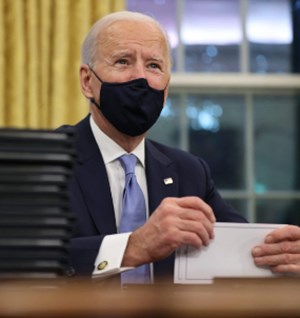US Senate Bill Could Deal Significant Blow to Biden’s Anti-Drilling Pledge
(Reuters) — U.S. President Joe Biden vowed during his 2020 election campaign to end federal oil and gas drilling as a major step in his strategy to fight climate change.
The U.S. Senate Democrats' $430 billion spending bill agreed this week could kill that pledge. If it passes, it would effectively guarantee continued drilling rights auctions on federal lands and waters for at least another decade.
Still, with Congress set to begin a summer recess by the end of next week, Senate Majority Leader Chuck Schumer faces a tricky road to quick passage for the bill, which would be a win for Biden and fellow Democrats hoping to retain control of Congress during midterm elections in November.
The legislation also contains nearly $370 billion for energy security and climate change efforts, including extended and expanded incentives for electric vehicles, solar and wind power. It was agreed on after more than a year of difficult negotiations between Schumer and fellow Democrat Senator Joe Manchin.
Manchin, who represents the coal-producing state of West Virginia and has sought to protect fossil fuel interests, ensured the bill contained protections for oil and gas.
For instance, it makes permitting of solar and wind facilities on federal land contingent on the Interior Department offering at least 2 million acres of land for lease to drillers within the previous year, a provision that would last a decade.
In federal waters, offshore wind leases would be contingent on the agency offering at least 60 million acres on the Outer Continental Shelf to drillers the year before, according to the bill's text.
The deal would also restore results of a November 2021 Gulf of Mexico lease sale that was annulled by a federal judge over its environmental impact, and require offshore auctions to be held in the Gulf and off the coast of Alaska that had been canceled earlier this year.
Green groups, while broadly supportive of the bill's billions of dollars of incentives for clean energy, criticized its protection of federal oil and gas leasing.
"That's where this bill is a bitter pill to swallow," Erik Schlenker-Goodrich, executive director of the Western Environmental Law Center, said in an interview.
"On the one hand you are very much moving us forward on climate action. And on the other hand you're taking it away."
The White House did not respond to a request for comment. Biden this week called the spending deal a compromise that does not deliver his full agenda but will ease inflation pressures.
One oil and gas group that sued the administration over its leasing pause called the provision "a pleasant surprise."
"Since this administration wants to advance only wind and solar, the bill would force them not to neglect oil and natural gas," Kathleen Sgamma, president of the Western Energy Alliance, said in an email.
While the bill protects the federal drilling program, it also includes reforms that would make development more expensive. It raises royalty rates for onshore drilling to 16.66% from 12.5% and increases minimum bids, rental rates and bonding requirements meant to protect taxpayers from paying the cost of well cleanup if companies go bankrupt.
It also eliminates non-competitive leasing, which allowed speculators to snatch up land parcels that were unsold at auction at very low cost, and imposes a fee on emissions of the greenhouse gas methane.
One analyst said the emissions reductions the bill would deliver would likely far outweigh the climate impacts of any new federal oil and gas leases.
"The 300-plus billion in additional incentives and investments on the clean energy side are probably a much more significant influence on emissions than those leasing components," John Larsen, a partner at Rhodium Group, said on a call with reporters on Thursday.
The bill's backers say it could cut U.S. carbon emissions 40% by 2030.
President Joe Biden pledged to end new federal leasing during his campaign for president, and his Interior Department tried to pause new auctions shortly after he took office. Months later, a federal judge ruled that they had to restart auctions.
Meanwhile, the administration has faced increasing pressure to address high energy prices driven by the economic rebound from the pandemic and Russia's invasion of Ukraine, leading the White House to ask the oil industry to ramp up production.
Related News
Related News

- Kinder Morgan Proposes 290-Mile Gas Pipeline Expansion Spanning Three States
- Enbridge Plans 86-Mile Pipeline Expansion, Bringing 850 Workers to Northern B.C.
- Intensity, Rainbow Energy to Build 344-Mile Gas Pipeline Across North Dakota
- U.S. Moves to Block Enterprise Products’ Exports to China Over Security Risk
- Court Ruling Allows MVP’s $500 Million Southgate Pipeline Extension to Proceed
- U.S. Pipeline Expansion to Add 99 Bcf/d, Mostly for LNG Export, Report Finds
- A Systematic Approach To Ensuring Pipeline Integrity
- 275-Mile Texas-to-Oklahoma Gas Pipeline Enters Open Season
- LNG Canada Start-Up Fails to Lift Gas Prices Amid Supply Glut
- Kinder Morgan Gas Volumes Climb as Power, LNG Demand Boost Pipeline Business





Comments